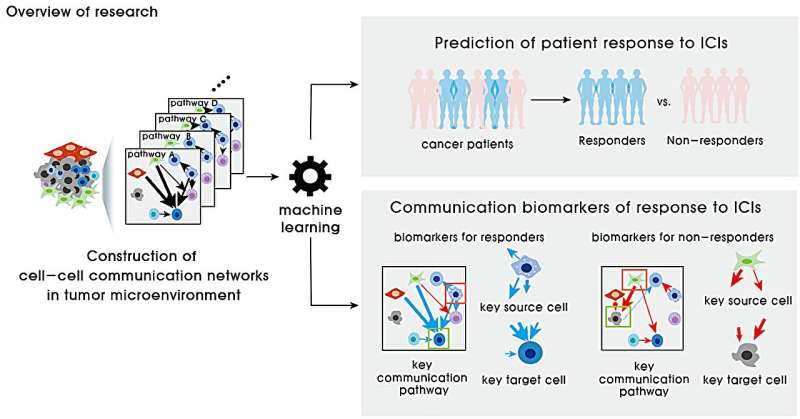This article has been reviewed according to Science X's editorial process and policies. Editors have highlighted the following attributes while ensuring the content's credibility:
fact-checked
trusted source
proofread
Deciphering cell-to-cell conversations: AI predicts anti-cancer immunotherapy response

A recent study introduces a novel approach to cancer treatment using artificial intelligence (AI) trained on cell-to-cell communication networks.
The researchers used AI trained on cell-to-cell communication to predict drug responsiveness in immunotherapy for cancer. Their work is published in Science Advances.
A Pohang University of Science and Technology (POSTECH) team led by Professor Sanguk Kim (Department of Life Sciences, and School of Convergence Science and Technology) and Dr. Juhun Lee (Department of Life Sciences) conducted the study in collaboration with the microbiome therapeutic development company ImmunoBiome Inc. (CEO Sin-Hyeong Im).
When immune cells fail to identify cancer and normal cells correctly, autoimmune disorders may arise. Immune checkpoints serve as a defense mechanism, preventing attacks on the body's own tissues. However, cancer cells often exploit these checkpoints to evade immune cell attacks, leading to the popularity of immune checkpoint inhibitors (ICIs) in cancer treatment.
Given the inherent variability in genetic and environmental factors as well as diverse tumor characteristics among patients, less than one-third of patients respond to a single ICI. Predicting patient responses is indispensable to formulating efficient cancer treatments and establishing new strategies for non-responsive patients.
Previously, the research team built an AI model in 2022, training it on protein interactions within cells to predict the efficacy of immune cancer therapy. In this latest study, the team took a step further. They trained the AI to learn cellular communication networks outside the cell. This advanced AI predicted patient responsiveness to ICIs by analyzing networks between cancer cells and immune cells, reminiscent of people communicating through social media.
The new model demonstrated high accuracy in analyzing samples from 700 patients with one of the four types of cancer cells—melanoma, stomach cancer, lung cancer, and bladder cancer. Furthermore, it managed to identify key communication pathways related to responsiveness and resistance to ICIs, pinpointing the cells responsible for these interactions.
Professor Sanguk Kim said, "This study will help us design personalized treatment strategies for each patient, enabling customized immunotherapy for cancer. The cell-to-cell communication network serves as a fundamental principle governing the immune system's functionality, and its application can extend to developing personalized treatment methods for various immune-related diseases," suggesting a promising avenue for further research and potential expansions.
ImmunoBiome CEO Sin-Hyeong Im, co-researcher in the study, anticipated "a significant reduction in the development timeline of microbiome therapies by using our technology."
More information: Juhun Lee et al, Cell-cell communication network-based interpretable machine learning predicts cancer patient response to immune checkpoint inhibitors, Science Advances (2024). DOI: 10.1126/sciadv.adj0785



















